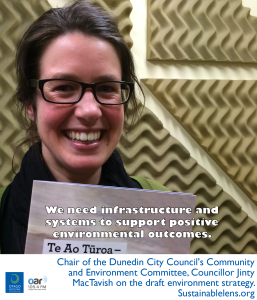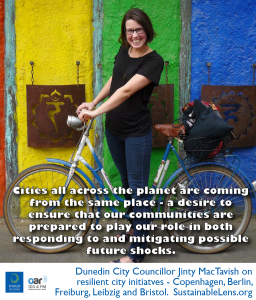We need infrastructure and systems to support positive environmental outcomes.
 Jinty MacTavish on the Dunedin's draft environment strategy [ 55:45 ] Play Now | Play in Popup | Download
Jinty MacTavish on the Dunedin's draft environment strategy [ 55:45 ] Play Now | Play in Popup | DownloadChair of the Dunedin City Council’s Community and Environment Committee, Councillor Jinty MacTavish on the draft environment strategy Te Ao TÅ«roa – The Natural World.
Good friend of the show, Councillor Jinty MacTavish is back to talk us though Dunedin’s draft environment strategy Te Ao TÅ«roa – The Natural World.
The draft strategy has three themes:
Consultation on the strategy is open until the end of August.
Talking points
Not having had an environment strategy has been a fraught thing for five years because it means that environmental concerns or issue have, I think, been inadequately considered as part of report development and subsequent Council decision.
This is a starting point for conversations rather than a final document.
Staff went back through the last 5 years of submissions, 11,000 submissions and pulled out the key themes people we telling us about the environment.
(Mayor Dave Cull’s introduction – all part of the Dunedin Ecosystem) Yes, I don’t think we’re entirely there yet, that concept of humans as part of ecosystem isn’t quite reflected right the way through the document, but he intent is there.
.
Ecotourism is an activity that leverages environmental strength
(11% of City protected, cf 33% nationally) Proportionately, we could be protecting more of our land. In terms of a gradation from natural environments to human dominated space, we’ve got a bit of work to do in thinking about projecting land for its natural value alone.
When we started this strategy, we quickly realised that if we were just doing for Council’s influence in terms of land it owns, it would be pretty limited when we’re talking about the environment.
I fought hard to get in here human connection with environment… there is challenge for us in helping people understand their role in the ecosystem when they are only seeing a very small part of it.
The presence of the Otago Regional Council as an environmental regulator doesn’t mean that we ought not have people dedicated to getting outcomes on the ground in terms of this strategy. we’re hoping for feedback from the community on the types of roles that will be needed. The Economic Development Unit, for example, is populated with people who are charged with delivering on specific projects under the Economic Development Strategy.
Working with different stakeholders, range of mechanisms and incentives…
Whenever you are writing an environment strategy, it is tempting to think of the environment as something that it “out there, that we can put a fence around and as long as we’re protecting it from possums and not developing it then it’s fine”, but we all know that that’s not going to work, that we are part of this ecosystem and that we need to be adapting and changing the ways that we are operating if we are to ensure that our environment in the broadest sense has a future.
Clearly our systems are not sustainable. We are too carbon intensive, we are destructive in that how we create our systems at present. We need to be starting to think about how we design our infrastructure and systems that support positive environmental outcomes rather than being just less bad.
Unless we as a population really understand what it is to be part of an ecosystem, and understand and treasure and feel connected to the ecosystem of which we are a part, we’re simply not going to care about protecting it. You need that motivator, you need that connection, you need that physical connection.
We should be designing infrastructure that enhances connection, not cutting off connection.
I would love to hear from people what parts of the environment they don’t feel connected to, and what would facilitate that connection.
The theme is about community connection, it’s not just about me caring.
I think there is a growing sense of the collective
We need infrastructure and systems to support positive environmental outcomes.
We need to move beyond the minimalist mentality, the mentality that says we can only ever do less bad. Then we can start to think about setting some aspirational targets in terms of giving back to our environment.
You can clearly have appropriate development, and you can have inappropriate development – and what this document is saying is that we want to set some pretty high standards for the type of development into the future to ensure that environmental concerns and aspirations are wrapped up in that development and taken into account at the front end. So that we don’t see the sort of development that erodes the life supporting capacity of our systems.
We have to as aspirational with this document as we have been with all of the others.
We have to be aspirational with our environmental goals, because when we get to conversations about trade-offs or synergy points, the environment strategy needs to be putting just as strong a stake in the ground as any of the other strategies.
(Is it possible to tell the percentage of Council spend that will come under this strategy?) No, everything the Council does will be influenced by this strategy.


